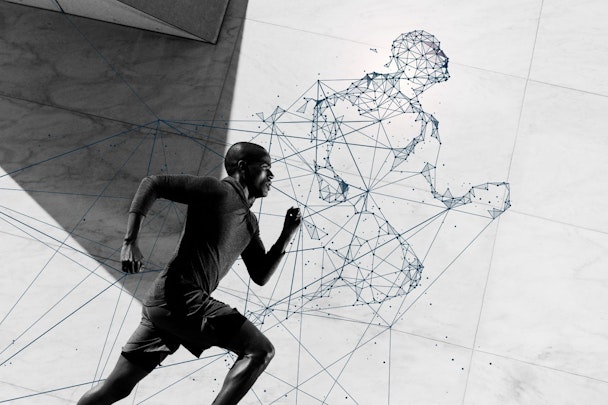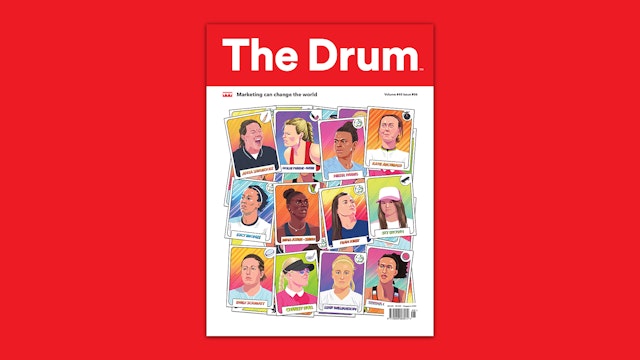5 of the biggest sports marketing trends of 2019
Once, big-name sponsorship deals were enough to satisfy sports marketers. But amid a saturation of advertising and proliferation of new channels, fresh opportunities are arising for brands and clubs alike to cultivate deeper relationships with fans.

Biggest sports marketing trends 2019
From women's leagues to AR and eSports, the sports marketing playbook is growing into a number of new arenas. Here The Drum charts some of the biggest trends in sports marketing for 2019 that brands should be aware of when entering, or developing their work, in the space.
Women in sports
A Nielsen Sports report stated that 84% of general sports fans find women's sport more “inspiring” and “progressive” than the male version, which is seen by many as being more “money driven”. These figures reveal the receptiveness of the public to women’s sports and the opportunity it presents for sports marketers to explore. Phil Carling, head of global football at Octagon, touches on the significance of women's football in this changing landscape for advertisers: “Consumers want their brands to stand for something and equality, diversity and inclusion would rank highly in any list of causes. In light of this, it is easy to see that women’s football can add a highly emotive cause-related string to its bow, offering advantages over its male counterpart.”
Brands are taking heed. Nike, for instance, put women's sport at the heart of its ‘Dream Crazier’ campaign at the beginning of the year. Starring and narrated by tennis legend Serena Williams, the ad is an open call for women in sports to fight back against gender bias and unfair stereotyping. Its message resonated after the controversies that plagued Williams throughout 2018, including criticism of her Nike catsuit worn at the French Open and her hotly contested loss at the US Open final. The viral hit helped to drive conversation around leveling the playing field for women in sports.
Regardless of the moral reasons for supporting women's sport, it makes commercial sense for brands to capitalize on the female consumer market. Currently in the UK, women are estimated to own half the personal wealth, a figure set to grow, and they are said to influence up to 80% of purchasing decisions. This presents a huge opportunity for sports to open up their marketing appeal to women and reap the economic rewards.
This surge in popularity is perhaps seen best in women’s football, where earlier this year we saw huge corporate sponsorship deals inked between Barclays Bank, Budweiser and Boots cosmetics and UK female football teams and leagues. Walgreens-owned Boots entered the sport for the first time to support Scotland, England, Northern Ireland, Wales and Republic of Ireland. Helen Normoyle, marketing director at Boots UK, said: “We are excited to give the inspirational women in these teams the chance to tell their stories and to hopefully encourage other women to experience the amazing confidence that sport can bring”.
This is a global trend. The Drum reported on a growth in interest for advertisers and sponsors in the Australian women’s Football League earlier this year. This is due to findings that more than half of the Australian population regularly tune into women’s sport, which represented a massive 48% increase on the previous year.
AR and VR
Although we are in the early days of virtual and augmented reality technology, there are examples of teams and brands making use of pre-existing platforms like Snapchat or Instagram to create immersive experiences for increasingly global audiences inside and outside stadiums.
In 2017 FC Bayern Munich created a fun interface for fans where they were able to virtually insert themselves into selfies with the team’s star players like Manuel Neuer or Arjen Robben. The feature was available to fans via its app, which could also personalize strips on the club’s online store. This immersive experience is reported to have bumped up the club’s revenue.
Major League Baseball has introduced AR to its ‘At Bat’ app, which shows data on each player including errors, fielding percentage and home run statistics when fans point their phones at the field. When a player hits a ball, the screen shows a trail tracing its trajectory with information on exit velocity, launch angle, apex and distance. The aim of the app is to enhance the game you're watching on the field, said Chad Evans, senior vice president, product development, mobile at MLB. "AR is going to bring new experiences to the fans, and baseball will be at the forefront," he added. "There are so many untapped possibilities of what this technology can do."
For advertisers and broadcasters, there are benefits too. Technology has already been trialled to personalize TV viewers’ experience of football games, most notably in 2018 when the FA and ITV ran a test during the England v Costa Rica friendly. Dynamic perimeter ads around the pitch were streamed to audiences based on location using Virtual Replacement Technology, allowing different viewers to see different ads. The ad offering was split into two feeds: one to the Americas, and the other to Asia, Australasia and parts of Europe.
Social channels
It is important that sports teams and athletes recognize the continued importance of social channels in building their fanbases and capitalizing on brand opportunities.
Social channels like Instagram and Twitter present spaces where fan communities can be cultivated and maintained. This prime advertising space can also be used to present a humanized version of athletes and round-the-clock access to the sport. Instagram stories and livestreams let athletes and teams give their followers what appears to be exclusive, behind-the-scenes style insights on training sessions and offer the opportunity to host impromptu Q&As to bring fans closer to their idols. Often these sessions are brand-sponsored.
The North Face clothing brand is a prime example of how social sponsorship deals with athletes can help to promote its own products, while also supporting the work of the sports star. Prior to the release of the Oscar-winning 'Free Solo' documentary, The North Face Instagram page featured stories and content promoting the film and extreme rock climber Alex Honnold. These stories gave viewers exclusive insights on where they could watch the movie and insider information on the athlete. Much of The North Face social content is produced with the aim of supporting outdoor athletes, with its social content putting the experiences of the experts at the heart of the brand's campaigns.
Such activity creates a proximity between the sports stars and their fans and an opportunity for relevant brands to authentically sponsor the action.
Sports teams are also able to leverage the social accounts of their top talent to boost engagement with their brand. Using the example of FC Barcelona, their Instagram following at 70 million is dwarfed by the 118m followers of its biggest star, Lionel Messi. Yet using their biggest footballing star in the role of authentic influencer, the club is able to promote the team as a whole, and the work they do.
Cause marketing
There has been a migration in the sports industry towards cause marketing, seeing big names and personalities using their authority to raise awareness of important issues. In 2018, former Manchester United star Rio Ferdinand and friend Jamie Moralee teamed up with mental health charity Calm (Campaign Against Living Miserably) to dispel harmful attitudes around men’s mental health. Playing up to typical alpha male banter, the footballers answer questions like “who would win in a fight?” and “who can drink the most?” before getting more personal about the importance of their friendship. By openly discussing their feelings and need for support, Ferdinand and Moralee were perfect ambassadors for the charity and helped to dismantle the traditional masculine stereotype.
Moreover, Sport England’s groundbreaking 2015 campaign, ‘The Girl Can’, was responsible for encouraging women to get more involved in sports. The minute-and-a-half spot features everyday women partaking in their fitness routines set to Missy Elliot’s ‘Get Your Freak On’. Rather than focusing on glamorous, impossibly fit women that create an intimidating culture in sport for the unfit among us, the ad homes in on the elements of exercise that are less than flattering - the sweat, the hard work - and celebrates them anyway. The campaign swept Cannes Lions in 2015.
Similarly, it’s important for brands to create narratives that both resonate with and involve their target audiences. A strong example of brand storytelling comes from Nike’s ‘We won it in France’ spot for the French national team, after they won the 2018 World Cup. Launching the club’s latest strip, Nike celebrated the hard work of the French team and its players by drawing on their impoverished backgrounds in the banlieues of Paris and arid pitches of Marseille. This ad was a love letter not only to the players but to the supporters and their country, interweaving their stories with that of the club.
eSports
In recent years the popularity of eSports has seen exponential growth, a fact which has not been missed by sports teams. In particular, the format has proven popular with football teams with so many millions of their fanbase regularly playing Fifa videogames.
Spanish football team Real Madrid recently released plans for their updated, high-tech new home stadium which will include an eSports arena for fans. This is not dissimilar to plans from Tottenham Hotspur to host eSports tournaments when its new stadium is completed. The club thinks it will be able to earn upwards of £3m for every non-footballing event, due to its 60,000-seat capacity.
This is not the first time that Spurs have shown the club’s belief in the power of eSports. At the end of 2018, the club was one of 20 Premier League teams that launched a competition among their fans, offering winners the opportunity to compete for and represent their favorite team in the ePremier League, a competitive video gaming event.
Christian Fuchs, a Premier League winner with Leicester City, is working on his own eSports venture called 'NoFuchsGiven'. “One of my big goals right now and I'm in talks with several partners is that I will build an eSports arena in New York," Forbes quotes Fuchs as telling the SportsPro Live 2019 conference. "I just purchased 36 acres, there are about 70 buildings on there. One will be transformed into a hotel, attached to the eSports arena which will be the only one in New York."
Such significant investment suggests eSports will continue to be one of the dominant trends in real sports for years to come.
This feature first appeared in The Drum magazine's June issue. For our Future of Sport issue, we talk to Wieden+Kennedy, the FA and Visa about how brands are elevating sporting heroines ahead of the World Cup. We meet Formula E racing teams, fitness brands betting on startups and NFL veterans reinventing themselves as media moguls. Get your copy here.

